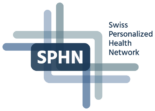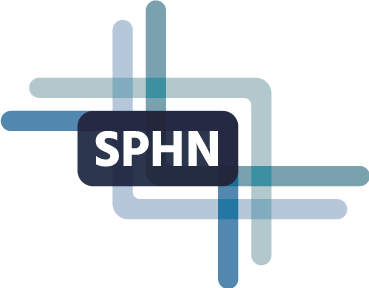PRECISE: Identification of biomarkers and therapeutic targets in inflammatory disease immunotherapy by high-dimensional single cell analysis and cluster proteomics
Project consortium: Prof. Burkhard Becher (University of Zurich), Prof. Manfred Claassen (former ETHZ, Universitätsklinikum Tübingen, Germany), Prof. Oliver Distler (University of Zurich/University Hospital Zurich), Prof. Tobias Derfuss (University Hospital Basel), Prof. Christoph Schlapbach (University of Bern/University Hospital Bern), Prof. Ruedi Aebersold (ETHZ), Bernd Rinn (ETHZ), Dr. Curdin Conrad (CHUV), Prof. Diego Kyburz (University Hospital of Basel, University of Basel), Dr. Vinko Tosevski (University of Zurich), Dr. Ralph Schlapbach (University of Zurich/ETHZ).
Main achievements
The goal of PRECISE was to identify predictive immune cell signatures for immunotherapy response in various autoimmune diseases and bring together patient data, comprehensive immune state snapshots in form of peripheral blood samples and a unique integrated sequence of high dimensional molecular single-cell measurements and computational analysis to meet these prerequisites. To achieve this goal we collected samples from multiple centers in Switzerland into the PRECISE consortium.
We focused on single cell immunophenotyping of patients suffering from systemic sclerosis, psoriasis, and multiple sclerosis. All clinical centers who contributed samples and clinical metadata are part of the PRECISE consortium. We took various measures to install and/or take advantage of data management/capturing systems at University Hospitals and research institutions. We interacted with the DCC to communicate the needs of the PRECISE project, with respect to data management and IT infrastructure as well as the contributions of your project to nationwide data interoperability and standards. In the context of this interaction, for each considered disease indication we shared prototypical clinical variables and data types of the project.
Leonhard Med was selected as the regional BioMedIT node and the project was onboarded successfully, having currently a secure space allocated and user access granted with possibility of accessing the system via both command line interface and via graphical web-based remote desktop. In addition, an openBIS instance with a data model was set up for managing the molecular and clinical data of the PRECISE project in Leonhard Med. Clinical data was successfully transferred via the BioMedIT process from several sources and registered in the openBIS instance in the PRECISE tenant in Leonhard Med.
Reusable infrastructures and datasets
Leonhard Med Tenant based on PRECISE model
The project developed a specific configuration of a Leonhard Med tenant that was suitable for studying autoimmune disorders. Based on the documentation developed by the project, re-deploying this configuration in another project is straightforward and – with some adaptation effort – possible also in other BioMedIT node.
The project used the Leonhard Med Service provided by ETH.
Available resources
The Leonhard Med tenant has been closed and the data that was used in the system has been securely archived.
Re-activating the tenant would be technically feasible by contacting the project leader of the project (Burkard Becher).
openBIS data model for autoimmune diseases
The project developed a bespoke data model for autoimmune diseases and implemented it in an openBIS instance running on the Leonhard Med tenant.
Available resources
The openBIS is available as an open source software package at https://openbis.ch/, as a service for open research data management at https://openrdm.swiss/ and as an add-on component to Leonhard Med secure data management service through ETH.
The project-specific configuration information can be provided by the project leader (Burkard Becher).
Follow-up projects
The members of the PRECISE team have numerous ongoing collaborations and will continue to work together. The general DTUA between our centers in Zurich, Lausanne, Bern and Basel will be instrumental in the free exchange of data and clinical samples. openBIS has been implemented in some of our labs as the main LIMS, but will not be required for data exchange. The PRECISE package on Leonard Med allows for secure data management, but we would envisage a national solution for the future.
Watch the SPHN Webinar
Recent advances in immunotherapy have provided a breakthrough in the treatment of patients suffering from chronic inflammatory disease. While the successes of immunotherapy are decisive, several inflammatory diseases remain untreatable. The identification of disease biomarkers and stratifiers of therapy responses is therefore a fundamental and urgent goal of personalized medicine.
View the video (SWITCH edu-ID required)
References on Pubmed
- Zwicky, P., Ingelfinger, F., de Melo, B.M.S., Ruchti, F., Schärli, S., Puertas, N., Lutz, M., Phan, T.S., Kündig, T.M., Levesque, M.P., Maul, J.T., Schlapbach, C., LeibundGut-Landmann, S., Mundt, S., and Becher, B. (2021). IL-12 regulates type 3 immunity through interfollicular keratinocytes in psoriasiform inflammation. Sci. Immunol. 6, DOI: 10.1126/sciimmunol.abg9012
- Diebold, M., Galli, E., Kopf, A., Sanderson, N., Callegari, I., Ingelfinger, F., Núñez, N.G., Benkert, P., Kappos, L., Kuhle, J., Becher, B., Claassen, M. and Derfuss, T. (2022). Immunological predictors of dimethyl fumarate-induced lymphopenia. Ann Neurol. https://doi.org/10.1002/ana.26328
Disclaimer: The contents on this website are intended as a general source of information and have been provided by the project PIs. The SPHN Management Office is not responsible for its accuracy, validity, or completeness.

